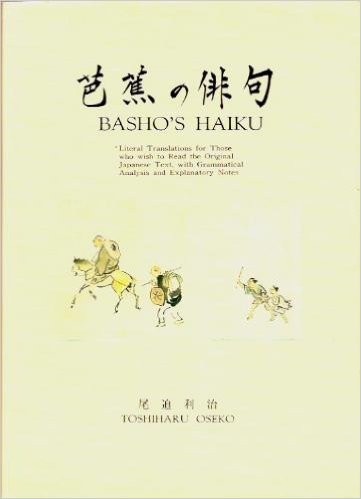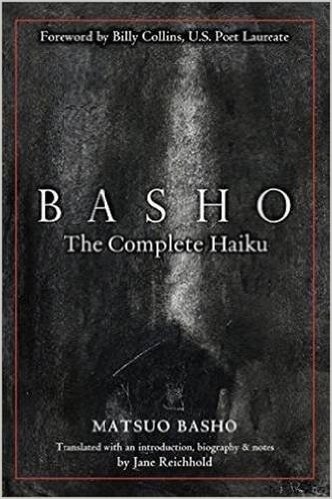Oseko's Complete Translations of Bashō Haiku; also Reichhold's
Matsuo Bashō
Oseko's translations
 Oseko's annotated translations.
Oseko's annotated translations.
 Comparison of Oseko and Reichhold translations.
Comparison of Oseko and Reichhold translations.
Other info on Matsuo Bashō:
 Haiku.
Haiku.
 Haibun.
Haibun.
 Renga.
Renga.
 Time Line.
Time Line.
Oseko's Annotated Translations
Toshiharu Oseko has published two remarkable volumes of
Basho's Haiku: Literal Translations for Those Who
Wish To Read the Original Japanese Text, with Grammatical Analysis
and Explanatory Notes.
The first volume appeared in 1990 and the second in 1996,
published in Tokyo: Maruzen.
The first (1990) volume
of Oseko's translations is available in the West.
The second can be seen in some university libraries.
The pair together are one of the best books read in 2016.
Main features of the Oseko:
- The first (1990) volume has 330 of the better-known haiku, a full page per haiku.
- The second (1996) volume the other 649 haiku, a half page per haiku.
- For every haiku, Oseko gives on the same page:
- The Japanese as originally written (kanji and hiragana characters).
- The romaji pronunciation of the Japanese poem.
- Oseko's translation.
- Word-by-word translation of the Japanese, including descriptions of
word alterations between Bashō's Japanese and modern Japanese.
This is especially useful for verb forms and is helpful for adjectival changes.
Vol. 1 contains special sections on grammar.
- Notes on the cultural context. These are rich and include historical events relevant to each haiku,
thus adding meaning that might be intuitive to the Japanese but would otherwise escape
most Western readers. Oseko's annotations, a powerful complement to his translations,
are fascinating.
My only criticism of Oseko's translations is that they contain considerably more punctuation
than a native English speaker would use.
Reichhold's Annotated Translations
Jane Reichhold published her volume of
Basho: The Complete Haiku.
Main features of the Reichhold:
- Published 2008 with 1012 haiku, typically six haiku per page.
- For every haiku, Oseko gives in separate section of Notes:
- The romaji pronunciation of the Japanese poem.
- Reichhold's word-for-word translation.
- Year and season when she thought the haiku was written.
- Word-by-word translation of the Japanese.
- Notes (usually two to ten lines) on the cultural context and sometimes with additional
information about the style of the poem.
- An informative twelve-page Appendix identifying and discussing 33 types of haiku technique.
- A chronology.
Comparison of Oseko and Reichhold translations
Because of the richness of
Oseko's annotations and the generosity of his translations,
I recommend him strongly over Reichhold for
someone wanting to study all of
Bashō's
haiku in a deep context of Japanese culture.
Unfortunately
Oseko's first (1990) volume is rare and expensive in the West.
The second can be even harder to find.
Both can be seen in some university libraries.
Jane Reichhold's Basho: The Complete Haiku (2008)
is widely available and a fairly good second best to Oseko. She augments
her translation with an introduction, biography, and notes. She lists the poems
sequentially in seven chapters totaling 214 pages:
- Early Poems 1662-74.
- Bashō the Professional Poet 1675-79.
- A Retreat to Nature — A Religious Life 1680-83.
- Bashō's Journeys in the Way of the Poet 1684-88.
- Bashō's Journey to the Interior 1689.
- At the Peak and Still Traveling 1690-91.
- Bashō Finds the Secret of Greatness in Poetry and Life 1692-94.
After the translations are:
- 179 pages devoted to commentary, literal translations, Romanized versions,
and original Japanese.
 12 pages devoted to haiku techniques.
12 pages devoted to haiku techniques.
- 2 pages for a selective chronology of the life of Matsuo Bashō.
- 10 pages for a Glossary of Literary Terms.
- 8 pages for an Index of First Lines (in Reichhold's translation).
In parallel with reading Oseko, I
checked every one of Reichhold's corresponding translations. Sometimes
Reichhold's are better poetry. But sometimes she takes liberties that
seem to limit or redirect the meaning.
Oseko, a modern native Japanese,
probably takes the reader closer to what Bashō intended.
|
While Oseko is my preference, if you cannot get hold of the Oseko volumes, the
Reichhold can serve.
If you are looking for most poetic translations of
Bashō,
you probably want the (limited number of) translations by a third translator —
Barnhill.
|
-
Links and Books.
-
[Thanks for visiting.]
 Highlights of Poetry.
Highlights of Poetry.
 Index of poetry.
Index of poetry.
 How to Write Poetry.
How to Write Poetry.
 Books read.
Books read.
 Yuki Teikei Haiku Society:
Yuki Teikei Haiku Society:
 Join.
Join.
 GEPPO magazine.
GEPPO magazine.
 Annual anthologies.
Annual anthologies.
 2007.
2007.
 2008
(a haibun).
2008
(a haibun).
 2010.
2010.


 Toward an Aesthetic for English-Language Haiku by Lee Gurga.
Toward an Aesthetic for English-Language Haiku by Lee Gurga.
 2004 Pescadero Haiku Weekend Workshop (including exercises) with Christopher Herold.
2004 Pescadero Haiku Weekend Workshop (including exercises) with Christopher Herold.
 Haibun.
Haibun.
 Haiku.
Haiku.
 Hay(na)ku.
Hay(na)ku.
 Rengay.
Rengay.
 Renku.
Renku.
 Tanka.
Tanka.
 Ballade.
Ballade.
 Concrete.
Concrete.
 Ghazal.
Ghazal.
 Lai.
Lai.
 Pantoum.
Pantoum.
 Prose poem.
Prose poem.
 Rondeau.
Rondeau.
 Rubáiyát.
Rubáiyát.
 Sestina.
Sestina.
 Skaldic verse.
Skaldic verse.
 Sonnet.
Sonnet.
 Terza rima.
Terza rima.
 Triolet.
Triolet.
 Tritina.
Tritina.
 Villanelle.
Villanelle.
 Bashō.
Bashō.
 Beverly Acuff Momoi.
Beverly Acuff Momoi.
 Buson.
Buson.
 Claire Gallagher.
Claire Gallagher.
 Hosai Ozaki.
Hosai Ozaki.
 J. Zimmerman.
J. Zimmerman.
 J. Zimmerman (haibun).
J. Zimmerman (haibun).
 J. Zimmerman (haiku).
J. Zimmerman (haiku).
 J. Zimmerman (tanka).
J. Zimmerman (tanka).
 Jane Hirshfield.
Jane Hirshfield.
 Kay Ryan.
Kay Ryan.
 Kay Ryan's style.
Kay Ryan's style.
 Kay Ryan The Best Of It: New and Selected Poems.
Kay Ryan The Best Of It: New and Selected Poems.
 Ki no Tsurayuki.
Ki no Tsurayuki.
 Marianna Monaco.
Marianna Monaco.
 Ouzel (James Arnold).
Ouzel (James Arnold).
 Patricia Donegan.
Patricia Donegan.
 Patricia J. Machmiller.
Patricia J. Machmiller.
 Renée Owen.
Renée Owen.
 Shiki.
Shiki.
